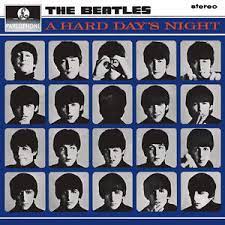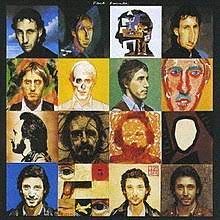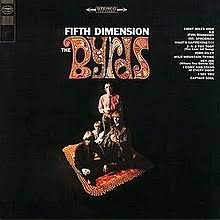🎸 Best Creedence Clearwater Revival Guitar Songs Volume 2
Step back into the golden era of swamp rock with Volume 2 of our Creedence Clearwater Revival guitar series.

This page features 10 more must-know CCR songs, blending gritty vocals, iconic riffs, and soulful rhythms that are a joy to play on acoustic.
Whether you’re jamming out to the driving beat of Travelling Band, strumming through the haunting vibe of I Put A Spell On You, or soaking in the emotion of Someday Never Comes, these lessons will walk you through every chord, rhythm pattern, and lead hook. Each song includes a full video demo and downloadable resources to help you master them.
🎸 Overview Video -
“Watch This Preview of My
Creedence Clearwater Guitar Songs Vol 2”
Soon.
John Fogerty Guitar Songs
Creedence Clearwater Revival Guitar Song List Vol 2
1. I Put A Spell On You2. Lodi
3. Long As I Can See The Light
4. Looking Out My Backdoor
5. Proud Mary
6. Ramble Tamble
7. Someday Never Comes
8. Travelling Band
9. Up Around The Bend
10. Who'll Stop The Rain
1. I Put A Spell On You - Learn To Play On Guitar
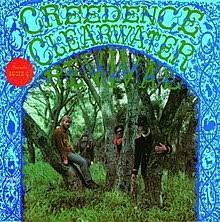
I Put A Spell On You was
released on several albums. The first was in 1968 from the Creedence
Clearwater Revival album and never cracked the top 40. The track was not
written by John Fogerty but instead by
Screamin' Jay Hawkins, which was a hit for him.
A re-release in 1972 fared better with the song reaching #12 and #3. The final release was in 1990 but the song only charted in The Netherlands at #64
CCR's rendition of "I Put a Spell on You" showcases John Fogerty's powerful vocals and the band's ability to infuse their own style into a classic blues-rock song.
Chords And Strumming
For chords here you'll need an Em, Am, B7, C, F, D, G and A in standard tuning and some lead. Play a down down down up down down and repeat rhythm pattern.
Guitar Lesson Details - (chords & lyrics sheet incl with lesson)
Chords & LyricsBack To Song List
2. Lodi - Learn To Play On Guitar
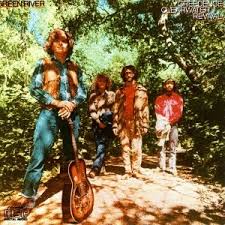
Lodi was released in 1969 as the B-side to "Bad Moon Rising," and tells the tale of a struggling musician who gets stuck playing in a small town that he never meant to stay in.
Written by John Fogerty, the song’s emotional core revolves around dashed dreams and the feeling of being trapped by circumstance — a relatable theme for many artists. With its laid-back rhythm and melancholic tone, Lodi stands out as one of CCR’s most reflective and heartfelt tracks.
Zip file below contains the lesson and chord sheet.
Chords And Strumming
Forgety plays this one in A# and then moves to a C. But for me vocally it's too high to sing so Instead I play this in G and move to an A. The chords here are G, D, C, D/Gb, Em and when the key changes you'll need the additional chords A, E, Gbm and an A/Ab. For rhythm play root up down up and repeat. Some lead required in this number.
Guitar Lesson Details - (chords & lyrics sheet incl with lesson)
Back To Song List
3. Long As I Can See The Light - Learn To Play On Guitar
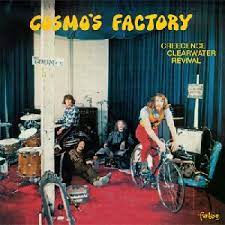
Long As I Can See The Light was mainly a B-side to Looking Out My Back Door but still managed to reach #20 in the UK and went to #1 in Norway.
The song hails from the 1970 album Cosmos Factory and featured John Fogerty playing electric piano and sax on the track which was written by John Fogerty
Although it was not released as a single, the song has become a beloved track in CCR's discography.
Chords And Strumming
Played in standard tuning with a down down up down up and repeat rhythm pattern. Some lead with the chords G, C/G, Em, C7 and D.
Guitar Lesson Details - (chords & lyrics sheet incl with lesson)
Chords & LyricsBack To Song List
4. Looking Out My Back Door - Learn To Play On Guitar
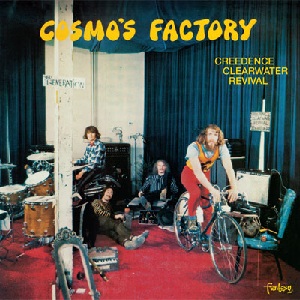
Looking Out My Back Door was from their 1970s album Cosmos Factory and managed a #2 spot. This was their only #1 song if you count the Cash Box chart, where it did reach the top.
Chords And Strumming
I play a root down up down up down up rhythm pattern here with some lead required and in standard tuning. For chords I play a D, Bm, G and A and for the key change play a B7, A7, E, Dbm and the A once more.
Guitar Lesson Details - (chords & lyrics sheet incl with lesson)
Chords & LyricsBack To Song List
5. Proud Mary - Learn To Play On Guitar
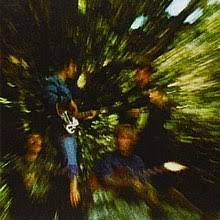
Proud Mary was another huge single from CCR in 1969 from their Bayou Country album and was written by John Fogerty.
This one made it to #1 in Austria and was a top 10 across several countries including a #2 in the US and Canada. CCR never had a #1 hit in the United States.
Chords And Strumming
I play a drop D tuning here with a down up stop up down up stop up rhythm pattern. The chords here are C, A, G, F, D and a Bm with some lead required.
Guitar Lesson Details - (chords & lyrics sheet incl with lesson)
Chords & LyricsBack To Song List
6. Ramble Tamble - Learn To Play On Guitar
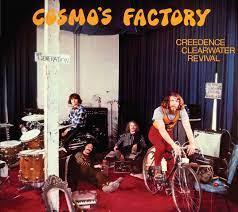
Ramble Tamble is a popular CCR song but was never released as a single.
It appears on the Cosmos Factory album of 1970 and was written by John Fogerty.
While it wasn't released as a single, "Ramble Tamble" is an album track that showcases CCR's ability to explore extended instrumental sections and display their prowess as a rock band.
Chords And Strumming
Another one I play with drop D tuning and a root down up down up down up rhythm pattern with some down strokes and some steady up and down shuffle rhythm. Some lead with the chords D, C, G, Am, G6 and F.
Guitar Lesson Details - (chords & lyrics sheet incl with lesson)
Chords & LyricsBack To Song List
7. Someday Never Comes - Learn To Play On Guitar
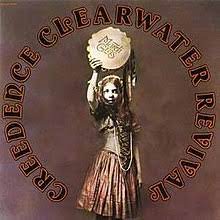
Someday Never Comes was released as a single and appears on the last album from 1972 called Mardi Gras.
The song peaked at #25 in the US and was the last single ever released by CCR before they officially disbanded in 1972.
Guitar Lesson Details - (chords & lyrics sheet incl with lesson)
A capo 2nd fret keeps you in the original key in standard tuning with the chords A, E, Gbm, Dm, F, D, Bm, A#, F, Dm, D#m, F#, D# and a Gm. No lead with a down down up down up down up and repeat rhythm pattern and then later its a down down up down down up down up pattern.
Guitar Lesson Details
Chords & LyricsBack To Song List
8. Travelling Band - Learn To Play On Guitar
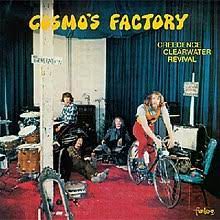
Travelling Band was written by John Fogerty and was included on the 1970 album "Cosmos Factory" and was written by John Fogerty.
The song peaked at #2 in the US and #8 in the UK.
Travelin Band" peaked at #2 on the Billboard Hot 100 chart in 1970 and reached #8 in the UK.
It became one of CCR's biggest hits and a concert staple.
Chords And Strumming
I play capo 2nd fret on this one with a down up down up and repeat rhythm pattern. Some lead with the chords E, A and B.
Guitar Lesson Details - (chords & lyrics sheet incl with lesson)
Chords & LyricsBack To Song List
9. Up Around The Bend - Learn To Play On Guitar
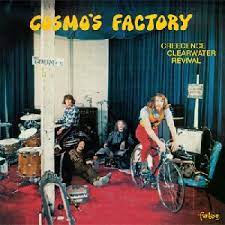
Up Around The Bend was the A-side with the song Run Through The Jungle. The song reached #1 in Australia and The Netherlands and was a top 10 in several other countries. The track was written by John Fogerty and
reached #4 on the Billboard Hot 100 chart in 1970.
It was released in 1970 from the Cosmos Factory album.
Chords And Strumming
The chords here are D, A, D/Gb and G while playing all down strokes for rhythm. Played in standard tuning with the chords D, A, D/Gb and a G.
Guitar Lesson Details - (chords & lyrics sheet incl with lesson)
Chords & LyricsBack To Song List
10. Who'll Stop The Rain - Learn To Play On Guitar
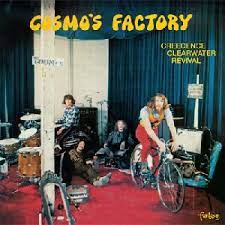
Who'll Stop The Rain performed quite well on the charts, reaching number 2 on the Billboard Hot 100 chart in the United States in 1970.
Chords And Strumming
This one is played in G but sung on the high end of G, so because it's out of my range, I'm using a capo 3rd fret and singing on the low end of A#. The chords you'll need are G, D, Em, C, Bm and an Am. There ks no lead but I put a break in this one with the rhythm root up down up and repeat in standard tuning.
Guitar Lesson Details - (chords & lyrics sheet incl with lesson)
Chords & Lyrics
Back To Song List
These Creedence guitar songs stand as proof of how timeless and powerful simple, well-crafted music can be. Volume 2 rounds out the CCR collection with more fan favorites like Proud Mary, Lodi, and Who’ll Stop the Rain, all arranged for intermediate-level players looking to add groove and grit to their songbook.
Be sure to check out Volume 1 if you haven’t already, and keep your CCR journey going strong!
If you liked this Creedence Clearwater guitar songs Vol 2 page you might also like ... (click images)
Popular Songs From The 60s
Contact Me
Tutorial Prices = $3.25 USD ea
Purchase Any 10 for $10 ($1 ea) - Add 10 items to cart and upon checkout
Add the code "Any10410" (no quotes) and click Apply
Price will drop from $32.50 to $10 - Checkout & check email)
